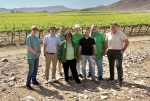Through appropriate management and allocation of oil, gas, and green hydrogen revenues, our country can promote economic diversification and thus build the basis for higher and stable growth, Bank of Namibia Governor, Johannes Gawaxab has said.
Gawaxab was speaking at the central bank’s annual symposium held last week which was themed “Maximising economic growth from renewable and non-renewable energy sources in Namibia”.
He noted that the critical challenge for Namibia is to harness the oil, gas, and green hydrogen resources by making the right strategic choices and synchronizing their implementation in a context that improves the lives of the poor through increased investment in health, education, physical infrastructure, and other non-oil sectors.
“However, this will only be possible if the Government approaches the oil and gas sector and the green hydrogen initiatives in a national, rational, and strategic manner. We are fully aware that these sectors cannot only bring significant financial resources and enormous transformational opportunities but also come with challenges. There are many examples around the world where developing countries have obtained windfalls from oil and gas but eventually ended up poorer than before. We must avoid the resource curse at all costs. We must learn from the experiences of others,” he said.
In prescribing the best foot forward in maximizing gains, Gawaxab also noted that the question in the mind of every citizen is how as a country, we should expect to gain from these new discoveries.
“One of the most immediate ways should be through additional direct and indirect employment. Exploration activities should also generate new infrastructures such as roads, railway lines, electricity supplies, schools, and hospitals that, although provided for the minerals industry and its workforce, can also benefit the rest of the population.
“It should contribute to developing skills and local businesses at the local level. Skills development should entail using the migration policy to facilitate skills transfer 3 and the acquisition of skills that are not locally available. Meanwhile, the economy can be stimulated as mineral companies forge multiple outward linkages – backwards to industries that supply goods and services or forwards to industries that process mineral outputs,” he added.
He went on to say that the issue of ensuring optimal local content in the exploitation of resources must remain prominent adding that the finalisation and adoption of the Local Content Policy is therefore of paramount importance.
Facilitating local content and participation in the oil and gas value chains has the potential to ensure broad-based benefits from these resources, Gawaxab explained further stating that to avoid and prevent the much dreaded “resource curse” that has plagued many developing countries with newly discovered natural resources, the private sector will need to capitalize on these opportunities.
“This brings me to the second critical success factor, transparency and accountability in allocating resources. This would ensure that access to these resources is granted in such a way that it prevents mismanagement and other abuses and that the benefits trickle down. How do we do this, you may wonder? Firstly, we need to ensure that Namibians and firms seize opportunities to provide services to these industries.
“Secondly, the allocation of these resources should be in a transparent manner; it should be done through an auction or open market bidding. Well-designed auctions can promote the efficient allocation of resources without requiring governments to have full prior knowledge of resource values or costs. Compared with administrative allocations, auctions are more transparent, less dependent on officials’ subjective judgment, and can yield more significant revenues or cost savings for governments,” explained Gawaxab.
Early this year, Namibia launched its own Welwitschia Fund, managed by the Bank of Namibia under the auspices of the Ministry of Finance – before announcements of significant windfalls were realized.
In this light, Gawaxab said that with the Fund, Namibia is better positioned to institute long-term oil and other natural wealth management.
“The Stabilization Account of the Fund will aim to insulate the budget and economy from commodity price volatility and external shocks to the Namibian economy. The Stabilization Account closely resembles “normal foreign reserve” assets to protect domestic economies against economic shocks through countercyclical positioning. The Stabilization Account is premised on the regular setting aside of the portion of specific categories of public revenue to build the Fund while applying strict withdrawal rules.
“As a result, the withdrawals will mainly be during exceptional circumstances. On the other hand, the Intergenerational Savings Fund facilitates the investment of defined proceeds from the present utilization of natural resources and from divestiture in state assets. Intergenerational Savings Fund aims to promote long-term prosperity and ensure intergenerational equity in the distribution of net economic benefits from the intertemporal utilization of the country’s natural resources,” Gawaxab said adding that scaling up renewable energy is no easy task and calls for mobilising massive savings and investing them productively in a risky environment.
“Renewables bring far-reaching benefits in terms of human health, energy access, environmental protection, and the response to climate change, along with the potential to create new jobs around the world. Sustainable energy finance is essential in the energy transition and innovation. Meeting a future global increase in energy demand in a sustainable way while reducing emissions from existing infrastructure will require billions of dollars of investment. However, there is currently a gap of many hundreds of billions of dollars between existing investments and what is required. This means that, as a country, we will need to ensure that the investment climate is conducive to attracting such investments, in addition to mobilizing local resources,” concluded Gawaxab.










